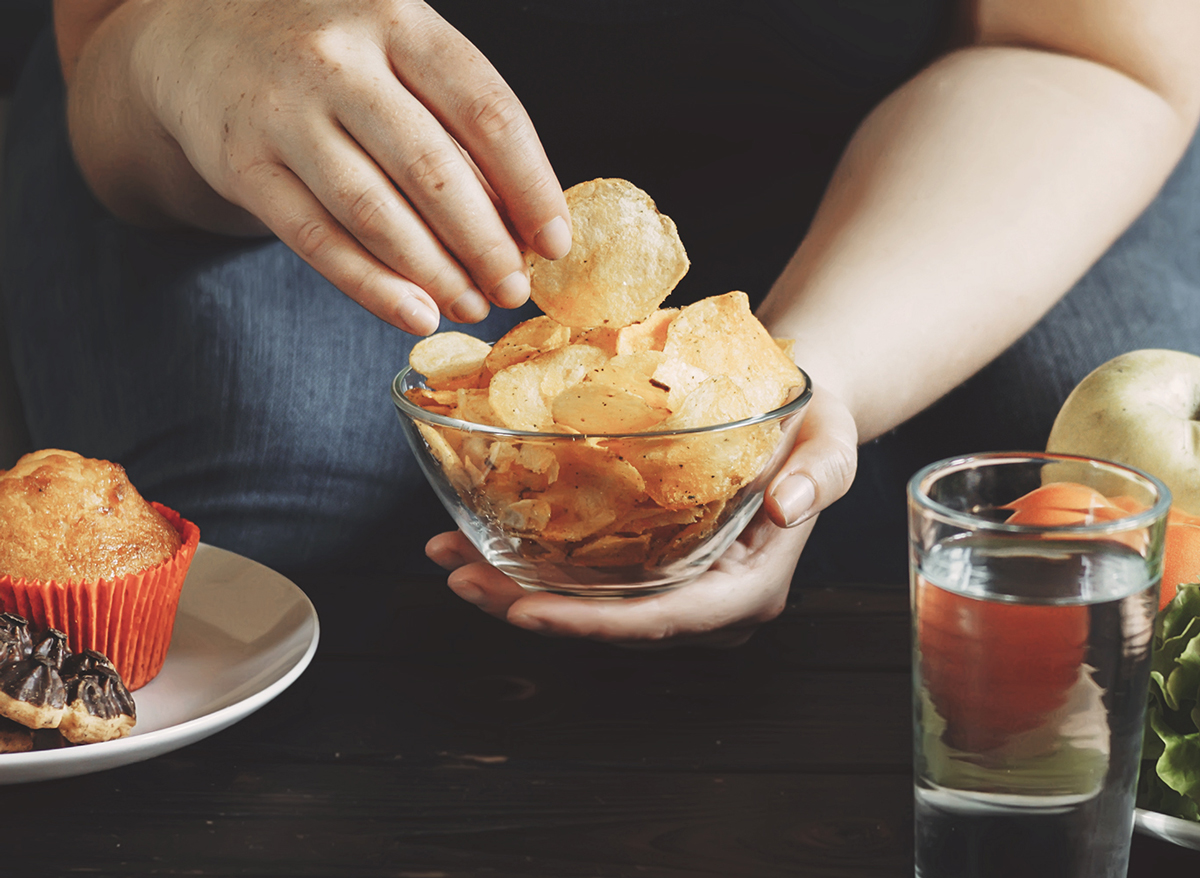Surprising Side Effects Stress Has On Your Waistline, Say Experts

Stress. Even just the word is, well, stress-inducing with that one-syllable utterance that hits your throat like a project deadline.
While many of us are aware of the common side effects of stress, what we may not be aware of is how exactly stress influences our weight. As it turns out, stress can often lead to weight gain and create a variety of other pesky results on your body.
We asked dietitian nutritionists to weigh in on five ways stress can impact your waistline. Read on, and for more on how to eat healthy, don’t miss 7 Healthiest Foods to Eat Right Now.
Stress can play a role in weight gain, particularly when it is chronic.

“One of the ways in which stress can contribute to weight gain is through ‘emotional eating,’ or using comfort foods that are typically high in energy and fat to cope with stress,” says Kylie Ivanir, MS, RD, who runs her own private practice called Within Nutrition, conceding that there are both physiological and psychological mechanisms underpinning emotional influences on our dietary patterns. “Eating will typically reduce irritability and increase calmness, with high fat or sweet foods often mitigating effects of stress via release of feel-good chemicals such as dopamine. These eating habits over time, however, can result in weight gain,” she continues, citing a Physiological Behavior study.
As Ivanir further elaborates, stress can lead to weight gain via a hormone called cortisol. “When under stress, the adrenal glands produce cortisol, which leads to a surge of energy by stimulating fat, carbohydrate, and protein metabolism,” she explains. “However, cortisol also increases appetite and cravings for sweet, fatty, and salty foods. With chronic stress, this overexposure to cortisol can lead to weight gain,” she adds, further noting that cortisol secretion also promotes abdominal fat accumulation.
For tips on how to manage cortisol levels, check out 15 Easy Ways to Lower Cortisol Levels so You Don’t Feel as Stressed.
If you’re already overweight, stress might tip the scale even further in the wrong direction.

“If an individual is overweight, they are more likely to stress eat which is defined as eating in the absence of physical hunger cues,” says Mary Wirtz, MS, RDN, CSSD, a nutritional consultant for MomLovesBest. “Individuals who are overweight also tend to crave high-sugar and high-fat foods as they are viewed as rewarding.”
This all ties back to what we discussed before: chronic stress leading to unhealthy eating choices. “In my experience working with clients, I have noticed that unmanaged chronic stress most often precipitates mindless eating and therefore eating in the absence of physical hunger. Chronic, unmanaged stress often leads to poorer food choices, excessive calorie intake, and also a lack of physical activity,” says Wirtz, who as a result of this says she works with clients to implement stress management and mindful eating techniques to improve their health and help people lose weight.
Echoing Wirtz’s sentiments, Marysa Cardwell, MS, RDN, CD, CPT, and consultant to the Lose It! community adds that one line of thought posits that stress can cause people to choose foods that are higher in fat or sugar. “A 2009 study found that stress related to work, personal relationships, life constraints, and finances were associated with weight gain, especially if you are already starting out with a higher BMI,” she says. “This can mean that if you are already an emotional eater that life stressors can lead to increased emotional eating and increased weight gain.”
Read More: What Feeling Stressed Every Day Does To Your Body
Stress can lead to feelings of weight stigma from other people, a phenomenon that can make you eat more.

“Stress and weight influence each other. As someone gains weight, they may feel weight stigma from others. Research has shown that being exposed to weight stigma increases calorie consumption- likely from an increase in stress,” says Cardwell.
“One study found that even being exposed to weight-stigmatized media led to increased caloric consumption for overweight individuals,” she adds. If you’re looking to cut back on high-calorie foods when you’re feeling frazzled, reach for these 21 healthy foods to eat when you’re stressed instead.
Stress can change your exercise routine, resulting in pound creepage.

Through Ivanir’s work with clients, she’s seen that stress can lead to weight gain because it can reduce the desire to exercise or engage in physical activity. “The benefits of exercise on health are innumerable; the direct impact of exercise on weight management is known, but exercise can also improve mental health. Exercise can actually help lower stress and decrease anxiety, yet when people are stressed they may feel unmotivated to exercise, which can ultimately impact their weight,” she says. “Evolutionarily, cortisol spiked when we saw a bear or were faced with danger. The surge of cortisol allowed us to run and escape danger. These acute increases in cortisol weren’t harmful, however, today we are experiencing chronic stress due to modern-day life and work. This is the type of stress which leads to detrimental impacts on weight.”
Stress can wreak havoc on your sleep hygiene, which in turn can make you pack on the pounds.

If you want to live well, sleep well. But as many of us well know, when we’re feeling particularly stressed, our healthy sleep schedule can get thrown out the window. “Another point to mention is that stress can have an impact on weight through its effect on sleep patterns. The relationship between stress and sleep can be cyclical, wherein stress can result in poor sleep quality and quantity, which can in turn negatively impact stress levels,” says Ivanir. “Poor sleep can lead to increased calorie intake and weight gain, potentially through changes in the appetite-regulating hormones leptin and ghrelin,” she continues, pointing to a 2013 study published in PNAS on the impact of insufficient sleep on calorie burn, food intake, and weight gain.
Beyond the weight gain and sleep connection, stress can impact your body in countless ways—from headaches and a weakened immune system to raising your blood pressure and making you sweat—read up ’em all here.








